- Pinnacle Career Institute is the right choice for practical career training in today's dynamic job market. We are more than 60 years strong in helping qualified students define success in their chosen field. We offer relevant career training in the medical, health & fitness, trades & technical, and alternative energy industries. Our instructors bring real world experience to the classroom to help you gain the skills that today's employers demand.
School Highlights
Pinnacle Career Institute serves 718 students (100% of students are full-time).
The college's student:teacher ratio of 15:1 is lower than the state community college average of 16:1.
Minority enrollment is 47% of the student body (majority Black and Hispanic), which is more than the state average of 41%.
Quick Stats (2025)
- Enrollment: 718 students
- In-state tuition: $14,048
- Out-state tuition: $14,048
- Acceptance Rate: 76%
- Student:teacher ratio: 15:1
- Minority enrollment: 47%
- Source: Integrated Postsecondary Education Data System (IPEDS)
Top Rankings
Pinnacle Career Institute ranks among the top 20% of public schools in Missouri for:
Category
Attribute
Diversity
Completion Rates
School Overview
The teacher population of 47 teachers has stayed relatively flat over five years.
Pinnacle Career Institute
(MO) Community College Avg.
Carnegie Classification
Not applicable, not in Carnegie universe (not accredited or nondegree-granting)
Baccalaureate Colleges: Diverse Fields
Institution Level
Less than 2 yrs
At least 2 but less than 4 years
Institution Control
Public
Public
Total Faculty
47 staff
139 staff
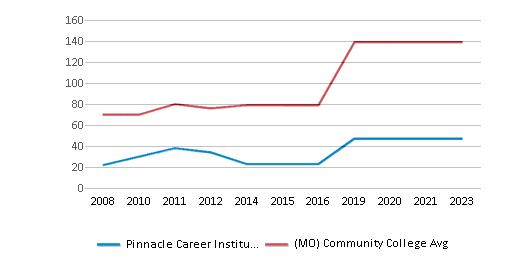
Number of Programs Offered
4
16
Student Body
The student population of Pinnacle Career Institute has grown by 101% over five years.
The student:teacher ratio of 15:1 has increased from 11:1 over five years.
The Pinnacle Career Institute diversity score of 0.65 is more than the state average of 0.61. The school's diversity has stayed relatively flat over five years.
Total Enrollment
718 students
1,159 students
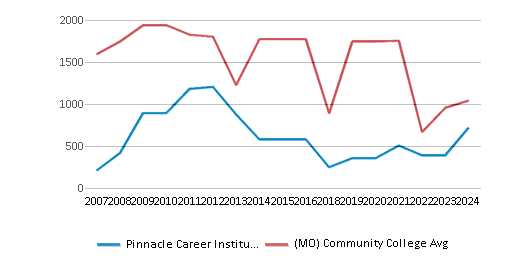
Student : Teacher Ratio
15:1
16:1
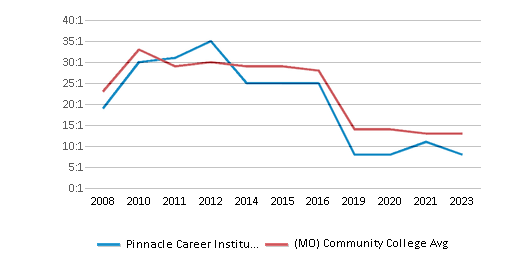
# Full-Time Students
718 students
718 students
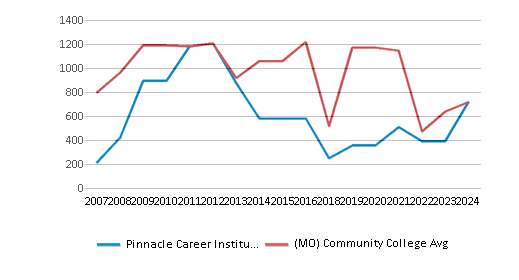
# Part-Time Students
n/a
1,407 students
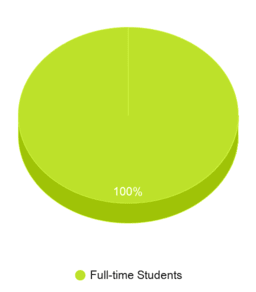
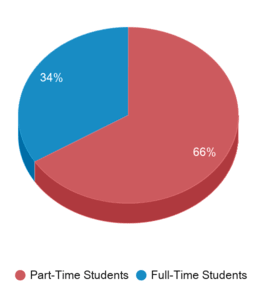
# Enrollment Undergraduate
718 students
246 students
# Full-Time Undergraduate Students
718 students
834 students
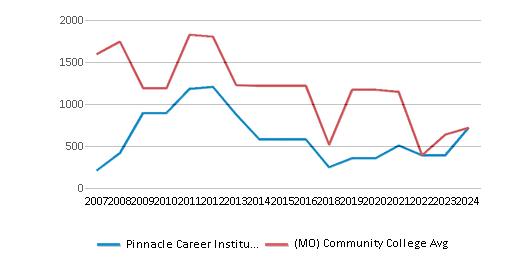
# Full-Time Graduate Students
n/a
11 students
# Part-Time Undergraduate Students
n/a
684 students
# Part-Time Graduate Students
n/a
9 students
Total Dormitory Capacity
n/a
200 students
% American Indian/Alaskan
3%
n/a
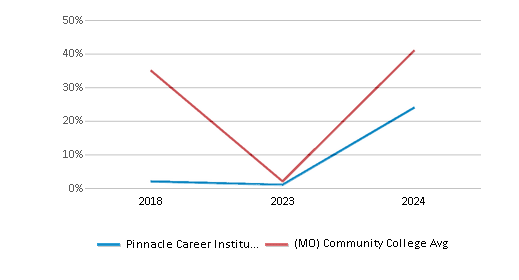
% Asian
1%
2%
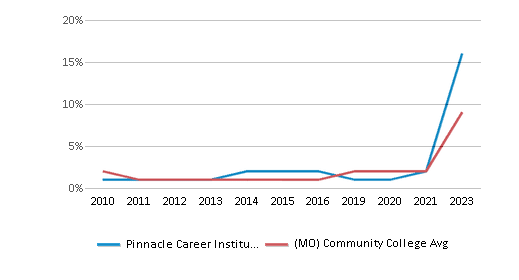
% Hispanic
16%
6%
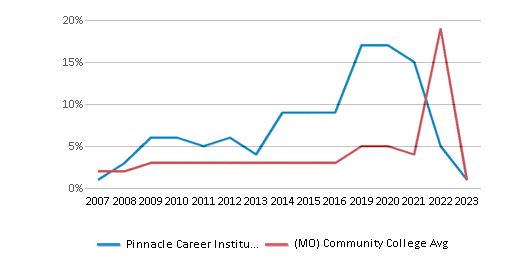
% Black
19%
10%
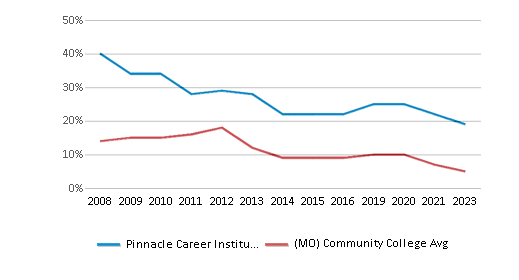
% White
53%
59%
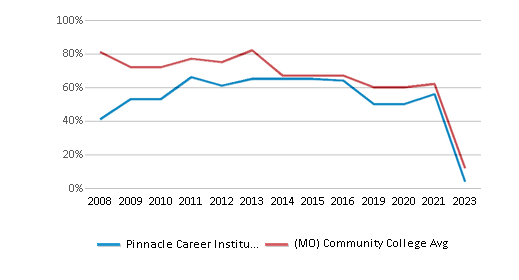
% Hawaiian
1%
1%
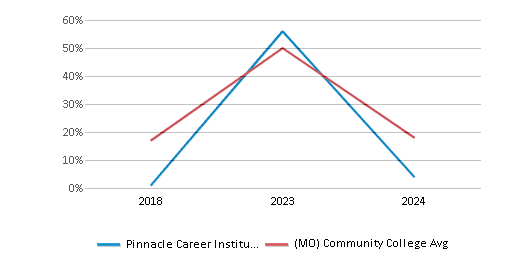
% Two or more races
5%
4%
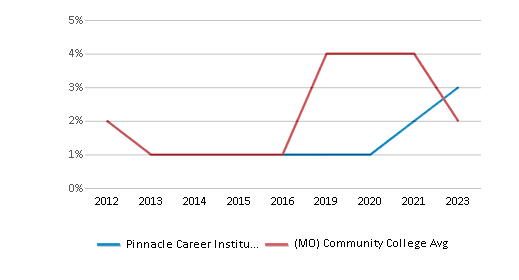
% Non Resident races
n/a
1%
% Unknown races
1%
17%
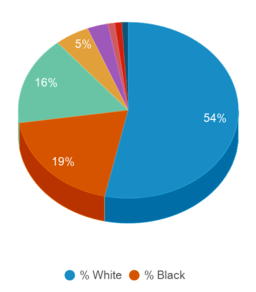
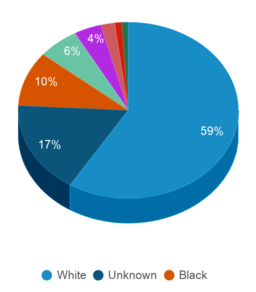
Diversity Score
0.65
0.61
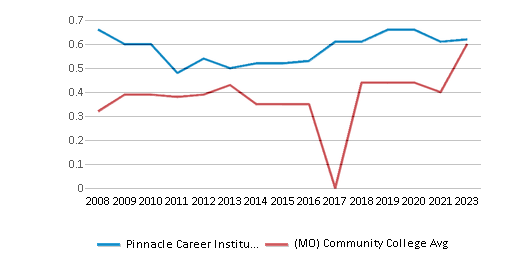
College Completion Rate (Students who graduate in less than 4 years)
0.9412%
0.433%
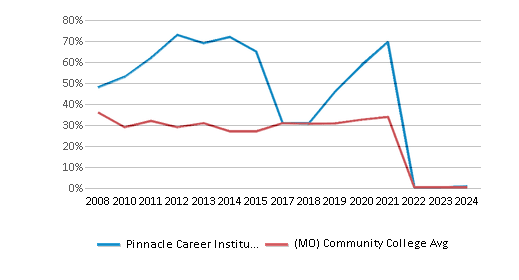
College Completion Rate (Students who graduate in 4 years or more than 4 years)
n/a
0.6154%
Average Graduate Earnings (10 Years)
$34,500
$30,900
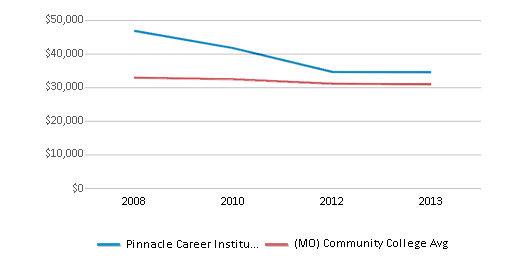
Tuition and Acceptance Rate
The public in-state tuition of $14,048 is more than the state average of $3,825. The in-state tuition has stayed relatively flat over four years.
The public out-state tuition of $14,048 is more than the state average of $5,579. The out-state tuition has stayed relatively flat over four years.
In-State Tuition Fees
$14,048
$3,825
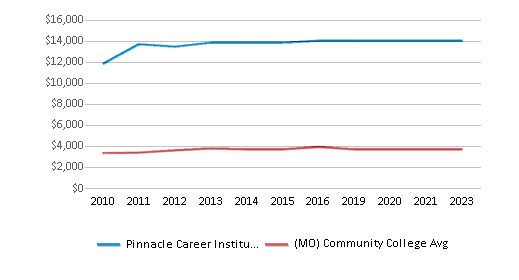
Out-State Tuition Fees
$14,048
$5,579
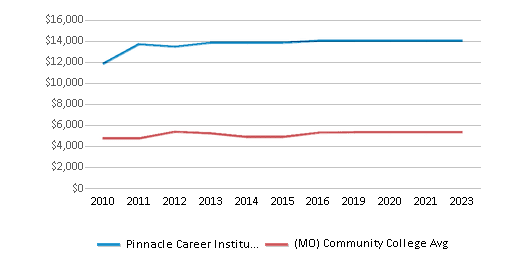
% Students Receiving Some Financial Aid
74%
91%
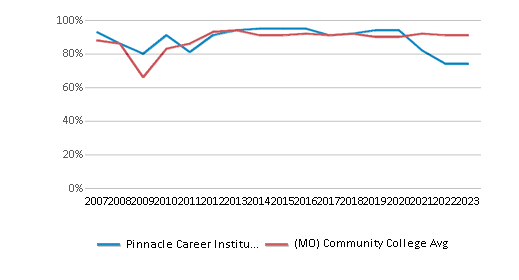
Median Debt for Graduates
$10,243
$10,500
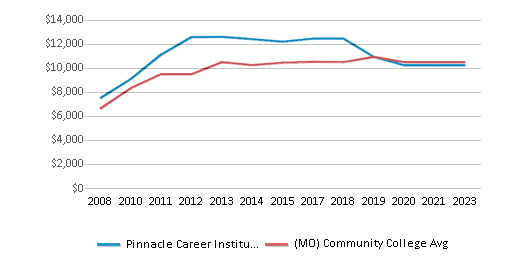
Median Debt for Dropouts
$4,399
$5,500
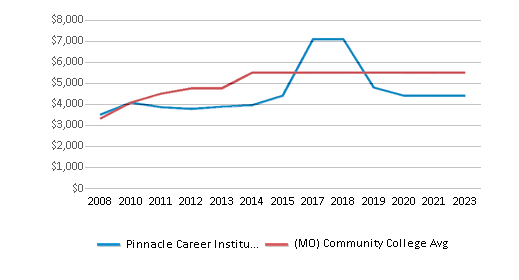
Acceptance Rate
76%
92%
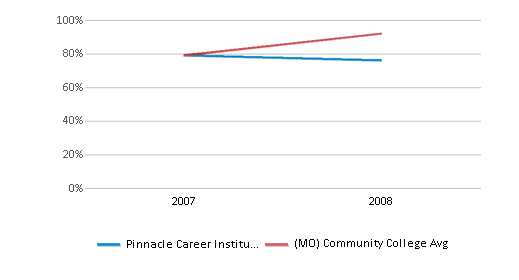
Source: 2024 (or latest year available) Integrated Postsecondary Education Data System (IPEDS)
School Notes
- Pinnacle Career Institute has been delivering quality educational programs since 1953 when it first opened its doors as Electronics Institute, a technical college in Missouri. Mr. Jeffrey C. Freeman and Scott F. Freeman purchased the school on June 2, 1992, and began the process of diversifying the programs available on the campus. With the addition of programs in Massage Therapy, Medical Assistant, Business Office Administrator and Medical Office Assistant, the school changed its name in September 2002 to more accurately reflect the diverse educational programs - Pinnacle Career Institute. As a vocational school, Pinnacle Career Institute has been adapting to the times and the needs of our students. To this end, we began offering Associate degrees in 1987 to better assist students in reaching their career goals. We offer two convenient campus locations (including one of the premier training colleges in Kansas City, MO and one of the best colleges in Lawrence, KS) and a unique online experience. Pinnacle Career Institute is accredited by the Accrediting Council for Independent Colleges and Schools. For more information about our graduation rates, the median debt of students who completed the program, and other important information, please visit our website at,http://www.pcitraining.edu/consumerinfo
Frequently Asked Questions
How much does Pinnacle Career Institute cost?
Pinnacle Career Institute's tuition is approximately $14,048 for In-State students and $14,048 for Out-State students.
What schools are Pinnacle Career Institute often compared to?
Pinnacle Career Instituteis often viewed alongside schools like Vatterott College-Kansas City by visitors of our site.
What is the acceptance rate of Pinnacle Career Institute?
The acceptance rate of Pinnacle Career Institute is 76%, which is lower than the state average of 92%.
What is Pinnacle Career Institute's ranking?
Pinnacle Career Institute ranks among the top 20% of community college in Missouri for: Diversity in US community colleges and Highest completion rates.
In what neighborhood is Pinnacle Career Institute located?
Pinnacle Career Institute is located in the Fairlane neighborhood of Kansas City, MO.
Recent Articles

Obtaining Your Bachelor's Degree at a Community College
Explore the evolving landscape of community colleges offering bachelor's degrees, addressing affordability, accessibility, and workforce needs.

A to Z of Community College Certificates and Courses
From business and healthcare to technology and skilled trades, the article showcases the breadth of options available to students seeking to enhance their knowledge, develop new skills, or pursue career advancement.

What is a Community College?
This comprehensive guide explains what a community college is, its history, and its role in higher education. It covers the types of programs offered, differences from four-year colleges, benefits of attending, and important considerations for prospective students, providing valuable insights for those exploring educational options.









